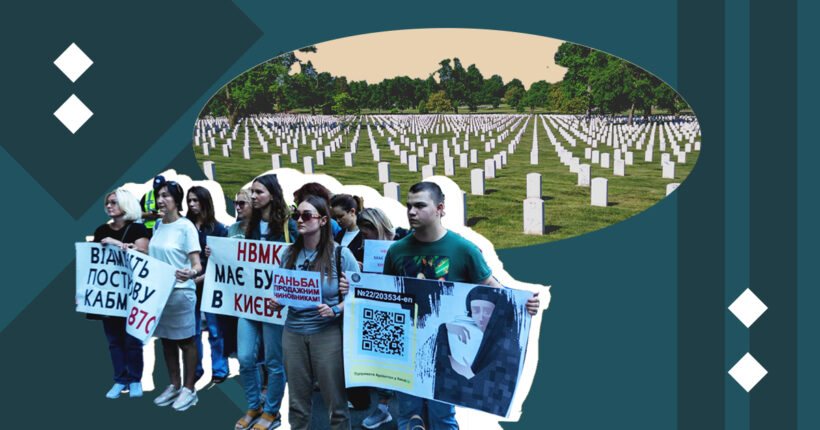
Rubryka spoke with the relatives of fallen soldiers who are forced to keep the ashes of their relatives at home or in a crematorium, attended their protest, and received an answer to a request from the state institution National Military Memorial Cemetery.
Background: Arlington National Cemetery is a military cemetery in Arlington, Virginia, USA, opened in 1864. Currently, there are about 400,000 graves in the cemetery. War veterans, presidents, Supreme Court justices, and astronauts are buried here. There are defined burial rules and requirements for them.
What is the problem?
The Russian-Ukrainian war is in its 10th year in Ukraine and has been full-scale for the second year. To this day, in Ukraine, soldiers who died in this war are buried in ordinary cemeteries, which sometimes have no space.
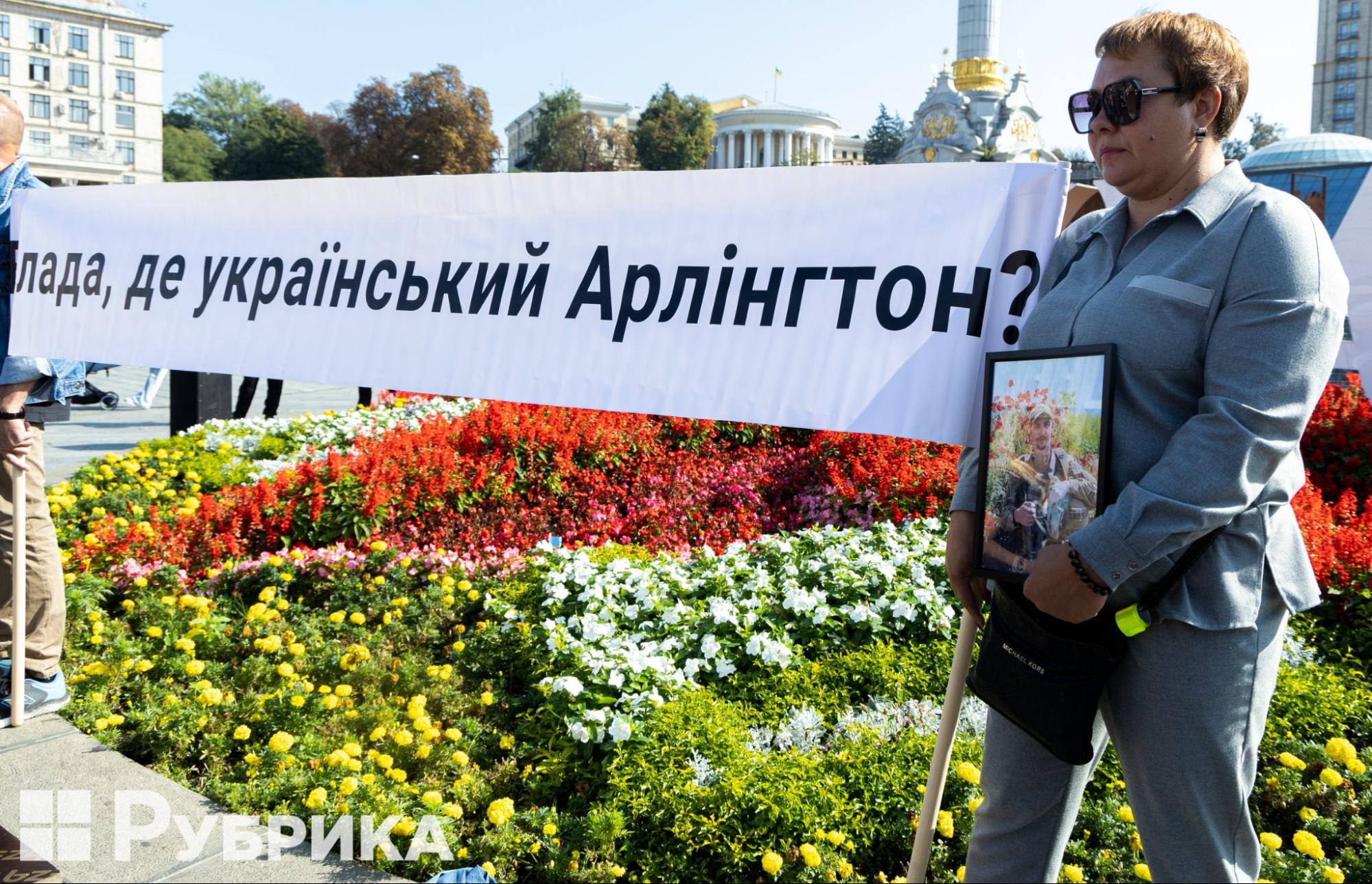
Participants of the Voices of Fallen Heroes action on Independence Square in Kyiv on September 26, 2023.
Some of the relatives of the deceased, and in particular those who lived in the currently temporarily occupied territories, still cannot pay due respect to their dearest people. Someone keeps the ashes in the crematorium by agreement, someone in their homes, on the bedside table, as relatives say. Such a situation is very insulting to people already experiencing great grief.
There is no National War Memorial Cemetery, and it is currently unclear when it will appear.
Three stories, one reality
"We are from Mariupol. Where should I bury my son?"
"They promised us an Arlington a year ago," Nataliia Mikhahos, the mother of the fallen soldier Ihor Krasnobryzh, does not hide her indignation.
"If this is Arlington, then it is such a symbol that Ukraine does not forget its heroes. This is a sign of our respect for the dead and our gratitude for freedom, for the fact that we are living now. Instead, they are "evicted" to the highway and cannot solve this issue in any way," continues Mikhahos.
Her son said if something happens to him and there is no way to bury him in Mariupol, he would like to be in Kyiv next to his comrades.
Ihor Krasnobryzh was born on March 15, 1995. He died on March 16, 2022, having just crossed the threshold of his 27th birthday. The soldier, who gave his life during the defense of Mariuopol's Azovstal, is survived by a daughter and a wife.
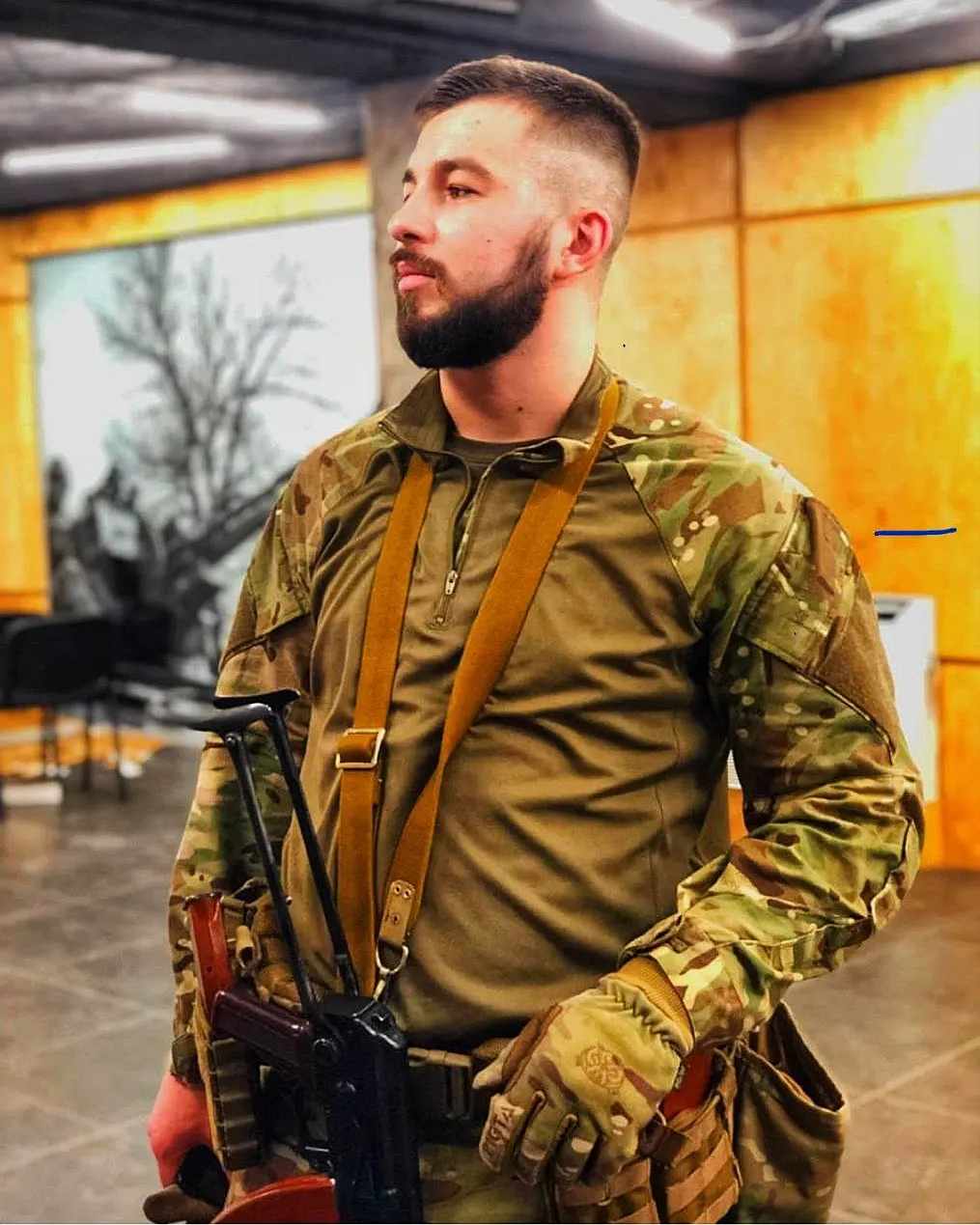
Defender of Ukraine, defender of Mariupol Ihor Krasnobryzh/ Photo from the family archive

Ihor Krasnobryzh with his daughter. This is his last photo, taken on March 12, 2022. Photo from the family archive
Krasnobryzh has six awards, Mikhahos says, among them the Order For Courage of 3rd class posthumously, and was also posthumously awarded the status of an honorary citizen of the city of Rivne.
"Imagine, on August 30 of that year, we had a farewell at Baikove cemetery. We did the cremation, and the urn is still in the office of the Azov Patronage Service. I can't take it home because I'm going crazy. I've been crying here for days," Mikhahos shares.
Mikhahos wonders where she should go. Now she lives in Rivne, where they also had an exhibition in memory of fallen heroes. There are banners on the local central square that the soldier's family visits daily because they have nowhere else to go. "When the exhibition ends, I will have nothing left, only a portrait. Well, how is that? I haven't been able to visit my son for more than a year," Mikhanos says with pain.
"We were not offered other options"
Anastasia Plokha, the wife of the soldier Oleh Rybalchenko, says that the feeding of promises about the cemetery started with the Ministry of Veterans: "Representatives of the ministry initially said that many families of Azovstal defenders have also been waiting for a cemetery. If you choose cremation, don't worry; there will be a cemetery, and then they will all be placed there. We were not offered any other options, so we have waited."
Then the location information changed every time: first, they said about Lysa Gora, then about Bykivnia, and on August 20, she simply read that everything was being transferred to Gatne in the Kyiv region.
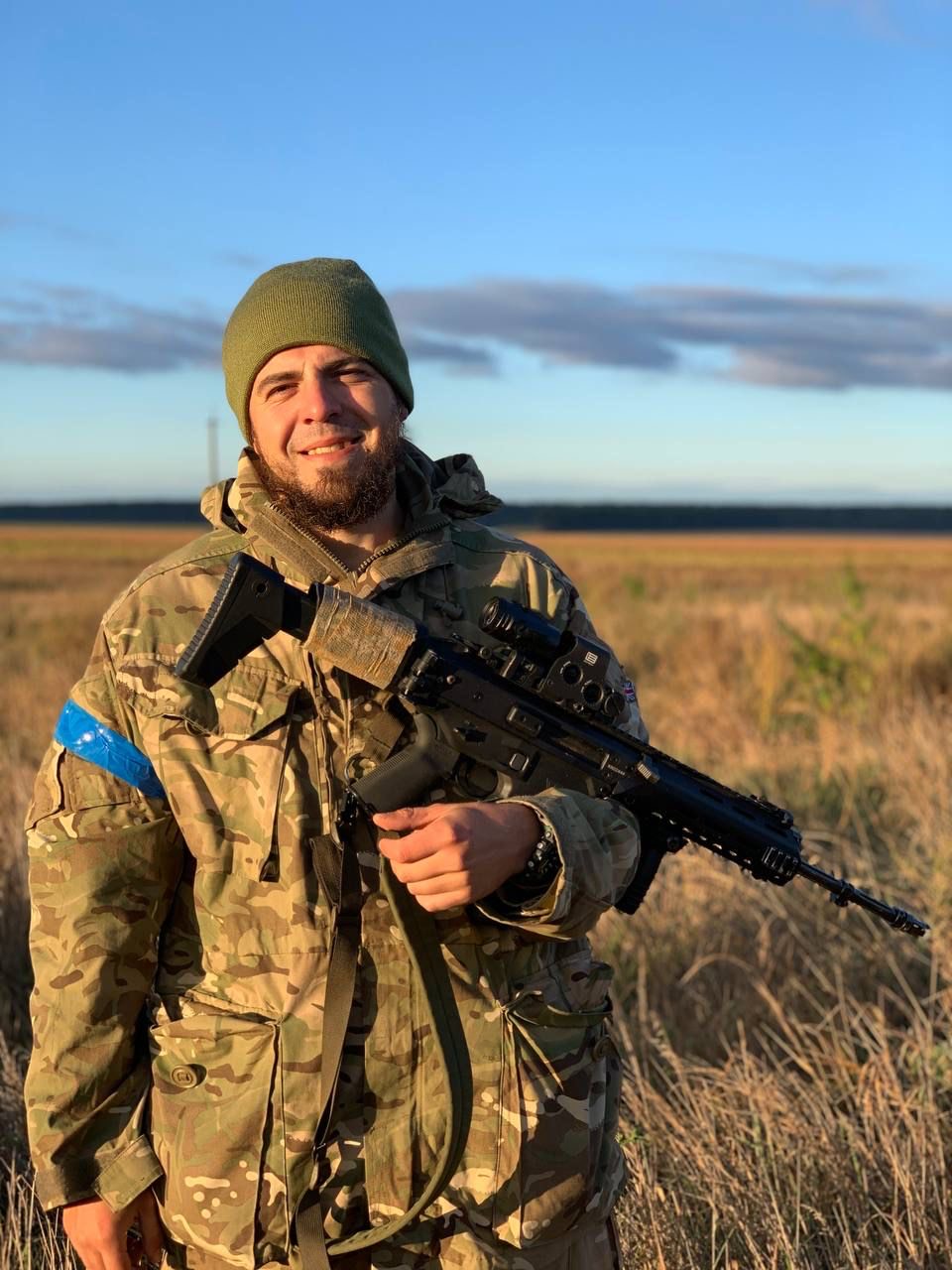
Defender of Ukraine Oleh Rybalchenko died in battles in the Bakhmut area. Photo from the family archive
Oleh Rybalchenko ("Fish") fought as a volunteer in 2014 as a student of the history faculty of KNU named after T. Shevchenko. In 2015, he returned, completed his studies, got a master's degree, and then worked as a journalist, exposing corruption schemes.
"On February 24, 2022, his former comrades gathered together, and with their company, UVO joined the 23rd separate battalion of special forces named after Bohdan Khmelnytsky under the separate presidential brigade of the Armed Forces of Ukraine. They took part in battles in the Kyiv region on the side of the Brovary. Then, they were training during the summer, and from the fall, they were in battles in the Bakhmut area," Plokha tells the story of her beloved.
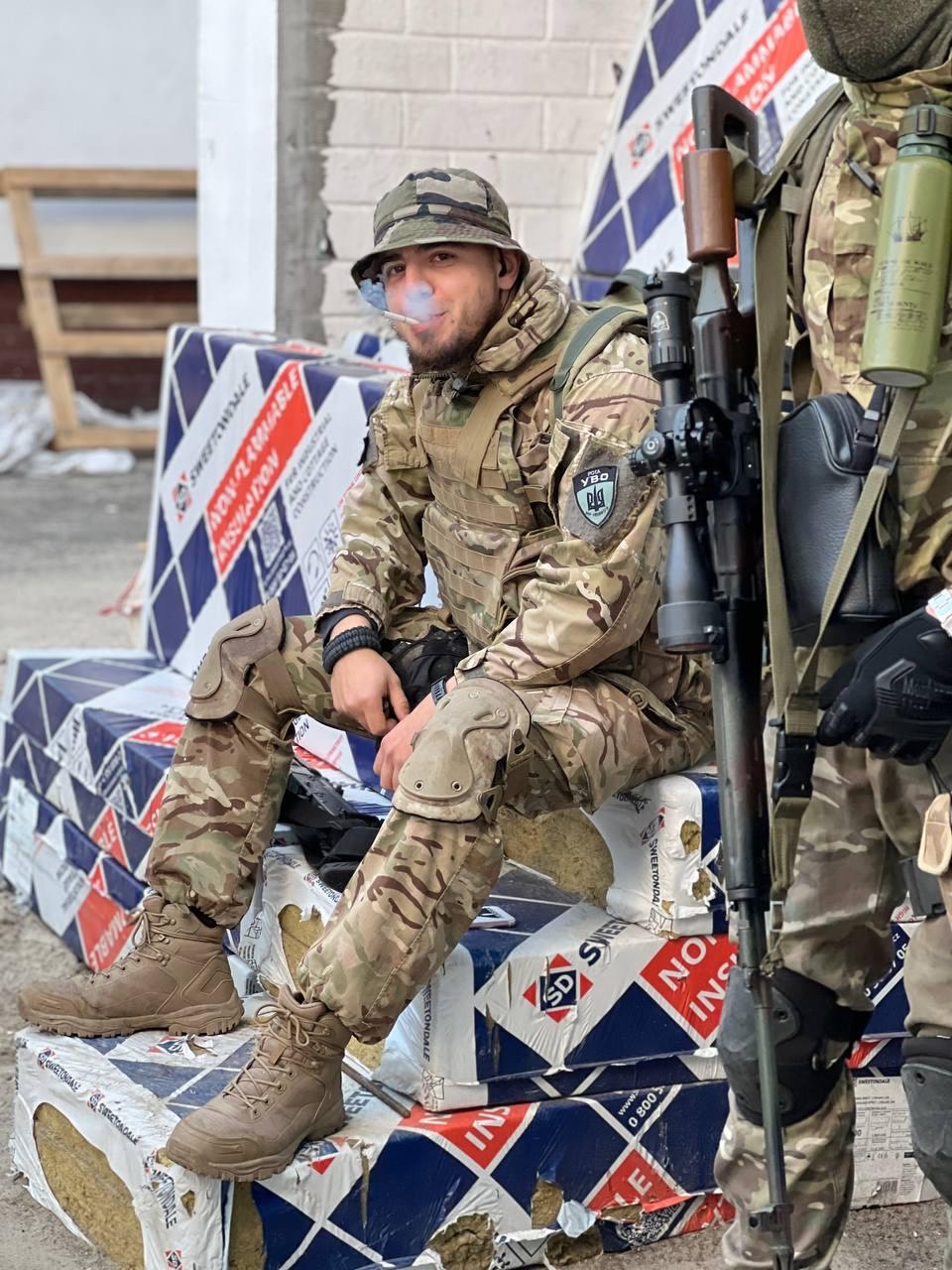
Oleh Rybalchenko/ Photo from the family archive
"They were standing there all the time: Klishchiivka, Ozeryanivka, all these villages. He was in an assault reconnaissance company. He died on December 21 in artillery shelling when the shell hit the trench," says the widow of the 28-year-old soldier.
She is also indignant: "Nobody communicates with relatives. Everything is done quietly. It is unknown at what stage the project that has been talked about for six months is now. We only read information, and no one understands anything. We turn to those representatives of the Ministry of Veterans Affairs, with whom we talked earlier, but they no longer work there. There is no communication from the officials."
"People are simply shocked by the actions of the authorities"
"We are from Mariupol. The war did not start for us now, but a long time ago," says Vira Lytvynenko, the mother of the fighter with the call sign "Vektor," the head of the non-governmental organization of the families of the fallen defenders of Ukraine, Sertse nAZOVni.
She told Rubryka about her son Vladyslav. He participated in the Revolution of Dignity when he was only 20. He fought near Donetsk, in Pisky, as a volunteer, and in June 2015, he joined the Azov regiment. By then, the family had already left for Kyiv, and he returned to Mariupol and has served all these years. While serving in Azov, he graduated from the Kyiv National University of Culture and Art, majoring in Interior Design. He defended his diploma near Svitlodarsk via Skype: he found a shed and laid out his project there. Vladyslav was studying when he came on vacation, and his mother hardly saw him.
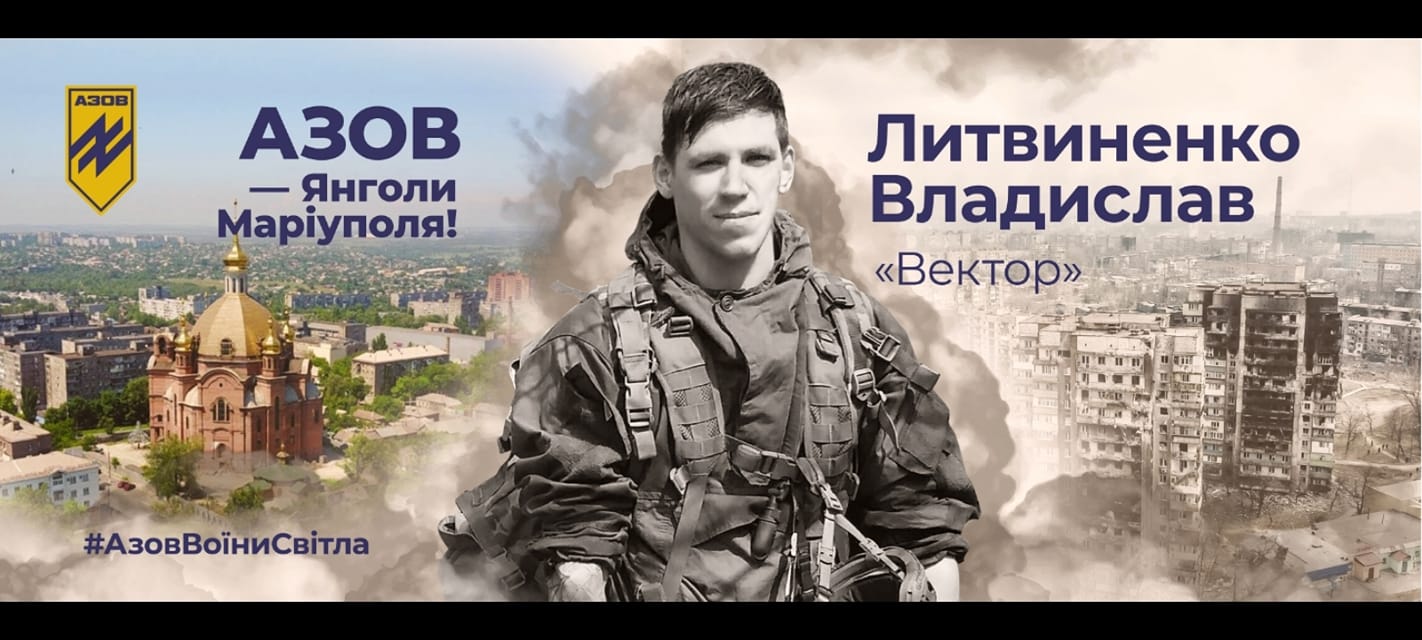
Vladyslav Lytvynenko, defender of Ukraine, defender of Mariupol.
When a full-scale war began, he worried more about his relatives in Kyiv than about himself and asked his relatives to leave. There was almost no communication with him in Mariupol. The last conversation Lytvynenko had with her son was on March 18, 2022: "We talked for so long. He said: 'So be it. Just know I do not regret anything." And that's it, then silence. March 25 is his birthday. We texted him, but he did not read the message. Only on April 7 was I informed that he had died in street fighting on the 23rd. He was in a group of special intelligence officers."
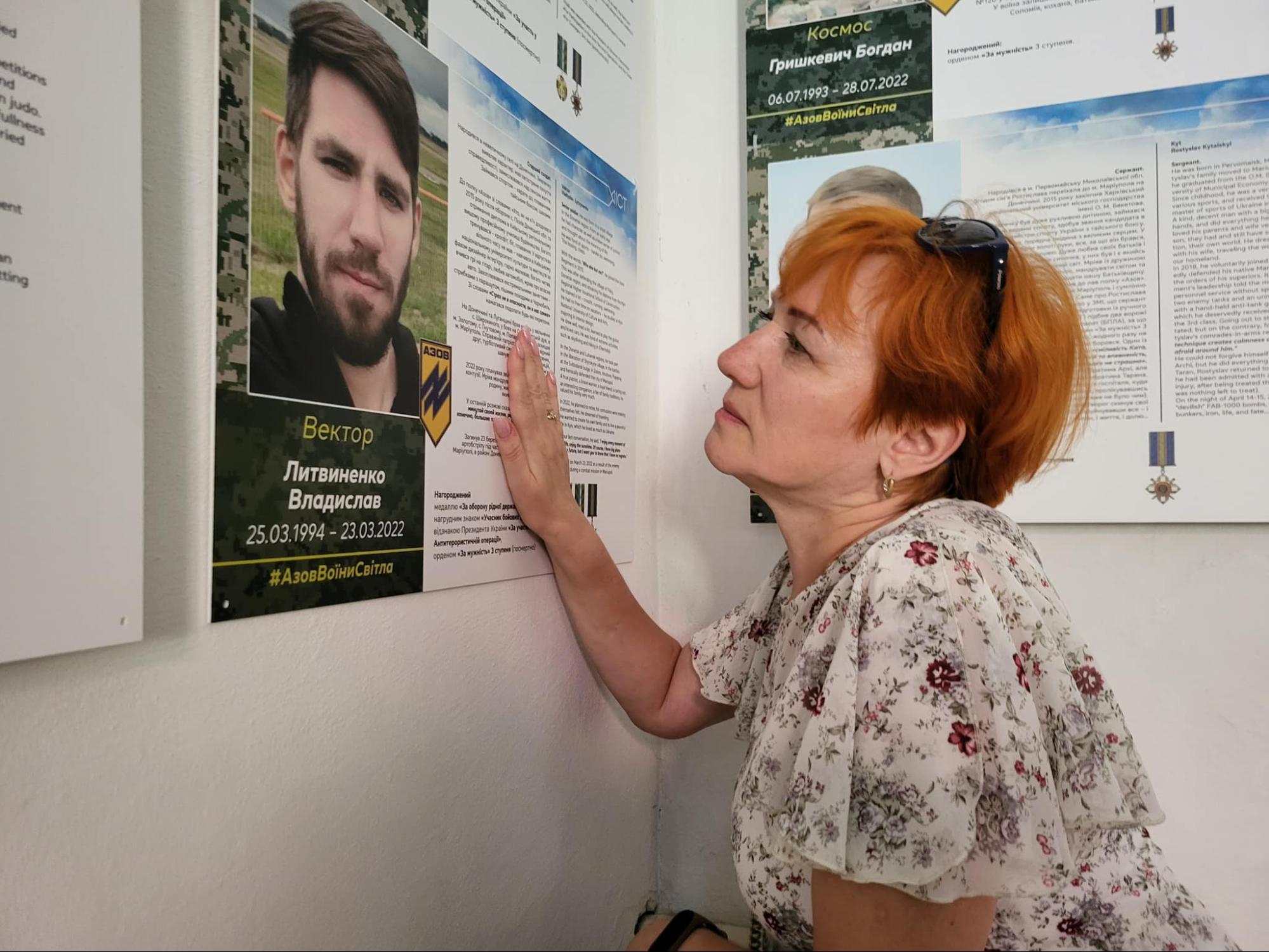
Vira Lytvynenko near the museum stand dedicated to her son Vladyslav. Photo from Vira Lytvynenko's Facebook page
His comrades said he was a powerful, hardy, brave, and strong warrior who always rushed into battle.
"Now I organize exhibitions in honor of the Azov soldiers, collect information, and see that all the boys there are so strong-willed and motivated. All as one were trained and protected us," says Lytvynenko.
Lytvynenko's son was cremated in November 2022. "Until November, we have temporary storage in the crematorium. Then we will take the ashes home and will join the ranks of those who have their son's ashes on the nightstand by the bed," Lytvynenko says bitterly.
What's going on?
The law was passed, but the president postponed the signing
According to the victims' relatives, there is humiliation, delay, and silencing of socially important information.
A separate legislation is required to establish a state war memorial cemetery.
One draft law was passed in the first reading, even before the full-scale war, but it was not signed.
In May 2022, the president signed this draft law as Law 2292, On Amendments to Certain Laws of Ukraine Regarding the National Military Memorial Cemetery (NMMC). This law defined what the NMMC is, who can be buried there, and who is responsible for its construction.
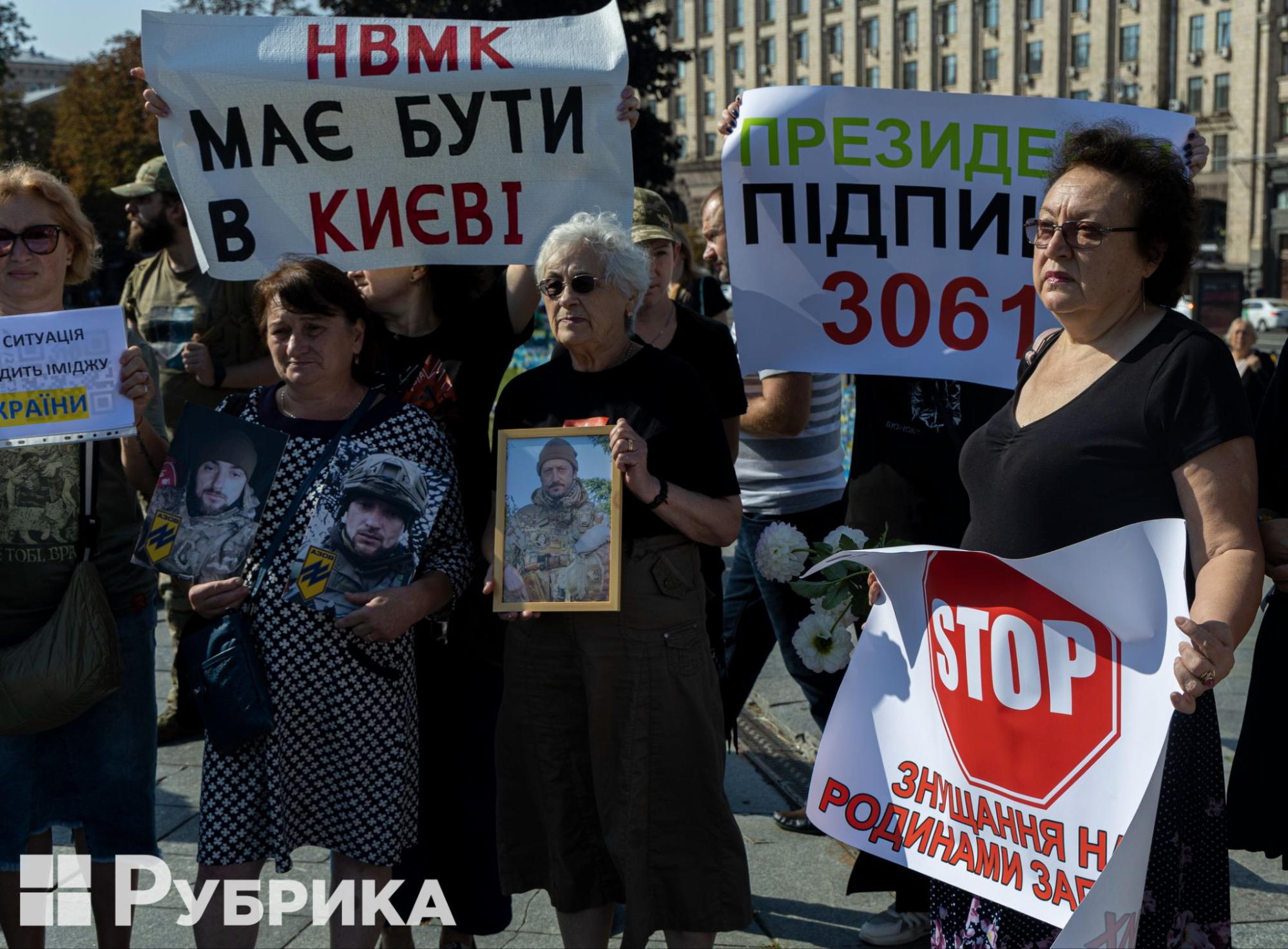
Voices of Fallen Heroes campaign on Independence Square in Kyiv, September 26, 2023
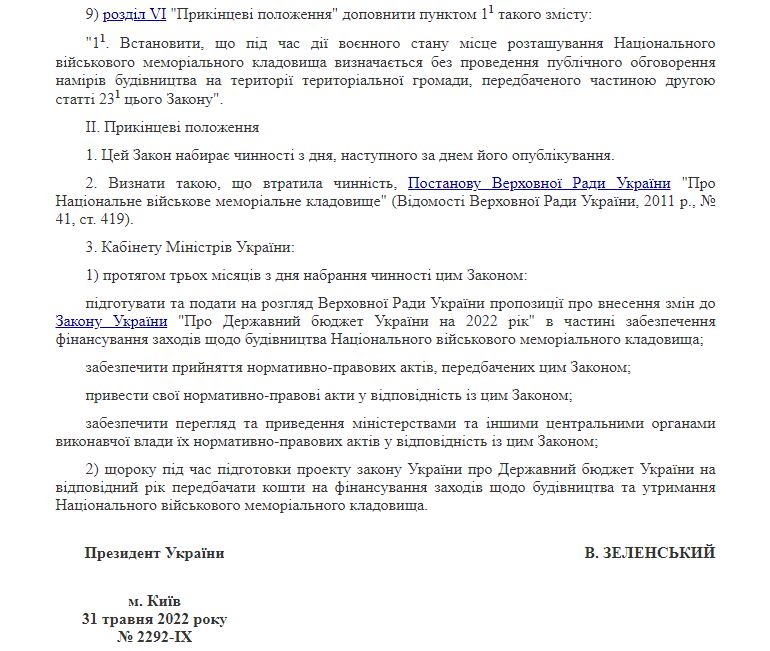
Screenshot from the text of Law 2292, On Amendments to Certain Laws of Ukraine Regarding the National Military Memorial Cemetery, on the website of the Ukrainian parliament
In particular, it reads: "The National Military Memorial Cemetery is an object of state ownership, is located on state-owned land, and is not subject to privatization or lease.
The location of the National Military Memorial Cemetery is determined taking into account public interests."
As the head of the non-governmental organization of the families of the fallen defenders of Ukraine Sertse nAZOVni, Lytvynenko says, the families of the dead were indeed included in the working groups that, starting in the summer of 2022, were engaged in the search for the optimal plot for such a burial. Among them was a section on the territory of the Gatne united territorial community near the so-called Odesa highway, and it was immediately rejected because there is a section of the Emerald network protected by the EU.
After protests by ecologists, they also rejected the plot on Lysa Gora and then settled on the plot in Bykivnia. It was approved in March 2023. Then, the victims' families were promised the first lines of burials for October-November 2023.
In May 2023, the authorities adopted by a constitutional majority the law On Amendments to Certain Legislative Acts of Ukraine Regarding the Placement of the National Military Memorial Cemetery in the City of Kyiv.
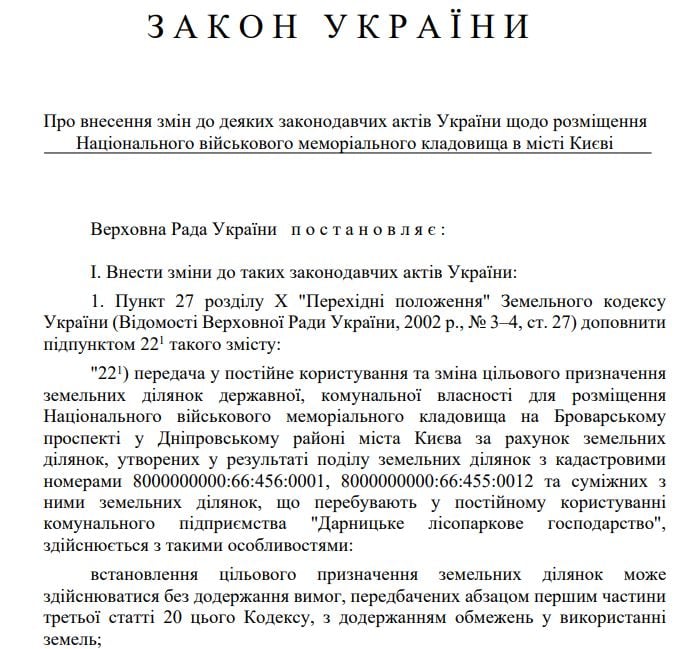
On the screenshot, the text of Law 3061 (the draft law had number 9240), where the area for NMMC is clearly defined.
On May 8, the law was submitted to the president for signature. And that's where the question got stuck. The law has not been signed as of the time of preparation of this material.
Cynicism "worthy of immortality"
An unexpected decision about another plot
On August 2, another meeting of representatives of the Ministry of Veterans Affairs with the families of the victims took place. At it, says Lytvynenko, the victims' families clearly said they were categorically against the plot not within the boundaries of Kyiv. They were promised the next meeting in 10 days, but it took place already on September 26 in a different atmosphere.
On August 18, information appeared that the Institute of National Remembrance is against the cemetery's location in Bykivnia: "the following detailed examination of this site showed that it has more disadvantages than advantages… Obviously, creating an object of national importance during the Russian-Ukrainian war, which continues, it is advisable to choose a plot of land that will have the potential for expansion and further improvement without harming previous burials."
The next day, August 19, the Cabinet of Ministers of Ukraine adopted Resolution 870 On the implementation of an experimental project regarding the design of the National Military Memorial Cemetery. At the suggestion of the Ministry of Veterans Affairs, it deals with the design of the NMMC on the territory of the Gatne community.
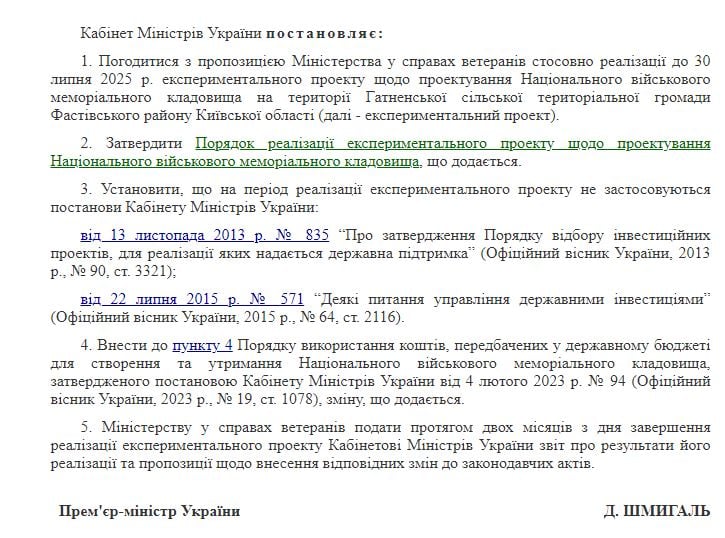
Screenshot from the text of Resolution 870 on the website of the Ukrainian parliament.
The families of the victims believe that they were insulted and deceived.
The First Deputy Minister of Veterans Affairs, Oleksandr Porhun, spoke on the telethon Yedyni Novyny about the plot in Gatne as a settled issue: "The location was chosen according to the following criteria: the total area of the plot must be more than 100 hectares taking into account sanitary standards and the possibility of building a memorial complex, a convenient location with available public transport, the possibility of holding official ceremonial events. And the most important thing is that the site should not have legal obstacles that could stop the construction of the NMMC."
Hero policy is very important, especially now, when our country is at war. And the memory of those who gave the most precious — their lives — for the freedom and independence of Ukraine should be immortalized with dignity. The National Military Memorial Cemetery is being created for the first time in the history of Ukraine. "We take Arlington National Cemetery as a basis. Burials here will be carried out with the consent of the families of the fallen Defenders of Ukraine," Porhun emphasized on that broadcast.
What is the solution?
What demands were sounded at the protest
Porhun met with these families of fallen defenders of Ukraine on September 26, 2023, at a protest they held on Independence Square, and then came to the Ministry of Veterans Affairs building with a demand to meet with Minister Yuliia Laputina. Instead of the minister, her deputy approached the people with colleagues.
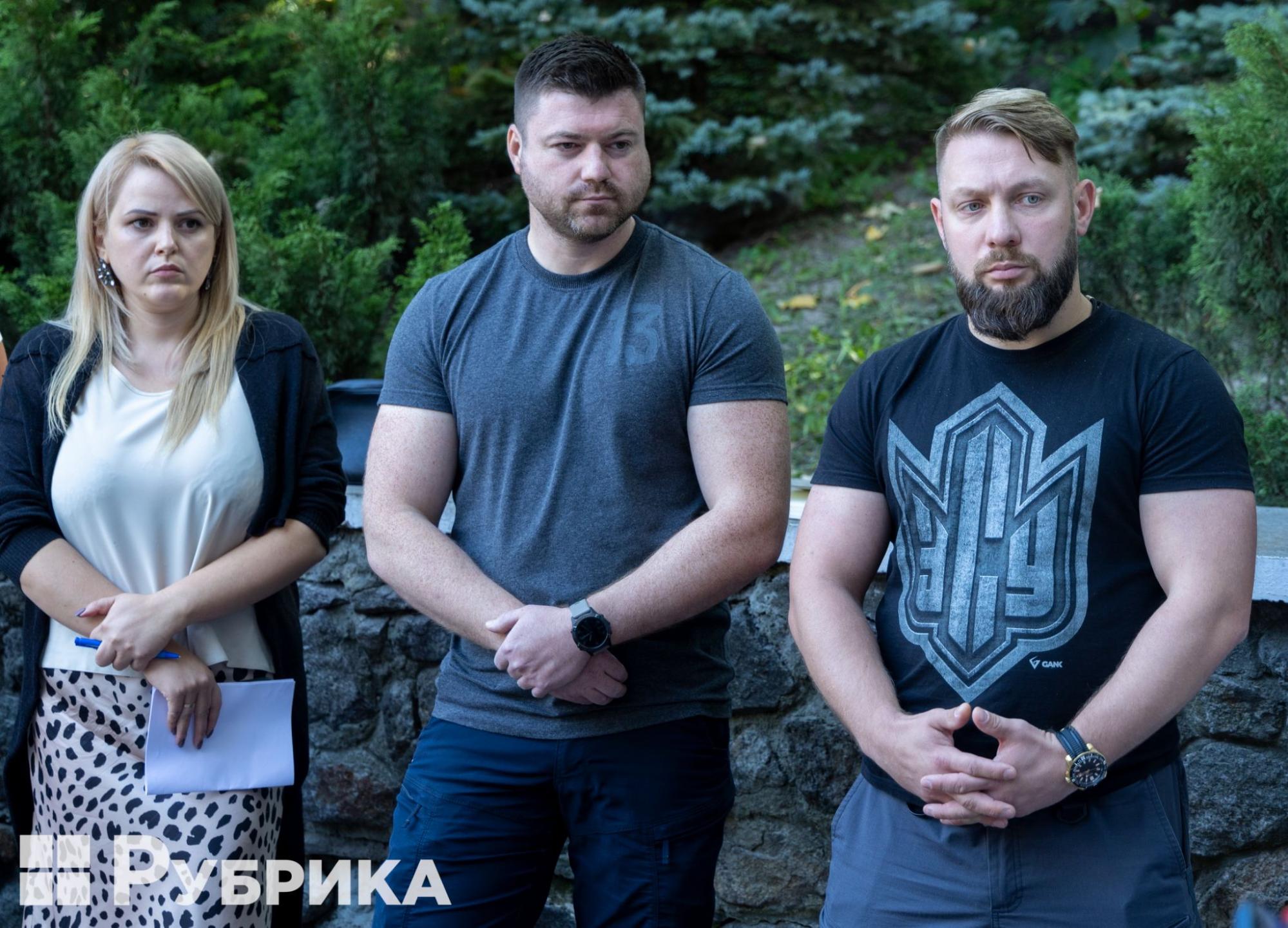
Representatives of the Ministry of Veterans Affairs went out to talk with the victims' families instead of the minister. First Deputy Minister Oleksandr Porhun is in the center.
During the action, the families of the victims demanded the signing of law 3061, the cancellation of Resolution 870, or the removal of the mention of the Gatne site from it.
"We demand that you listen to us and start a dialogue. We demand the construction of the National Military Memorial Cemetery in Kyiv as soon as possible. It is in the capital that there should be a Ukrainian Arlington," Lytvynenko voiced a joint appeal.
At this meeting, Porhun and his colleagues assured the victims' families that there was no question of a final decision regarding the plot in Gatne. On the other hand, the project draft, which is already being developed on the order of state institution NMMC, has no reference to the area.
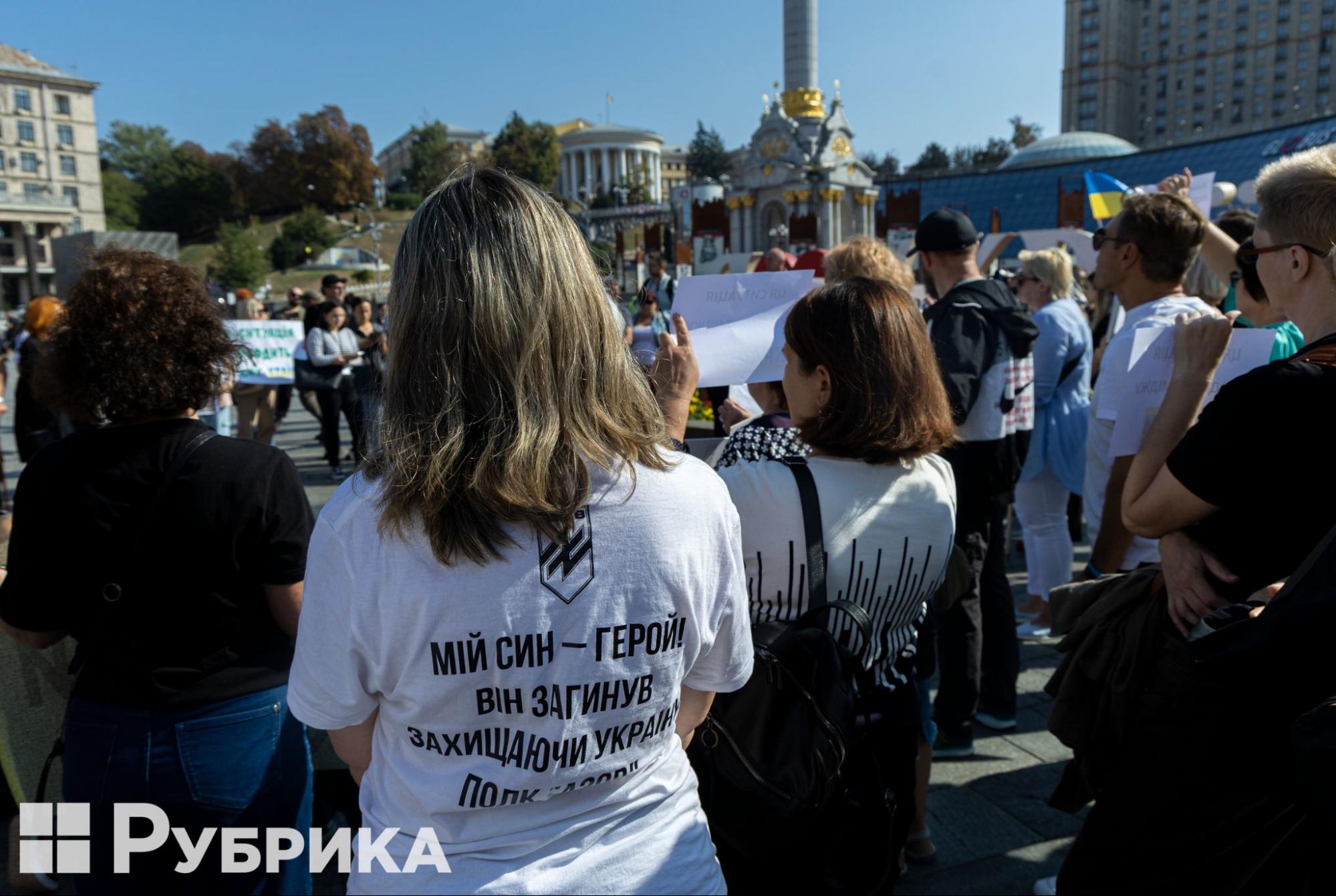
Participants of the Voices of Fallen Heroes action on Independence Square in Kyiv on September 26, 2023
As of the time the material was being prepared, the victims' families received promises from representatives of the Ministry of Veterans Affairs to convey their demands and requests for a meeting with the President of Ukraine to Minister Yulia Laputina.
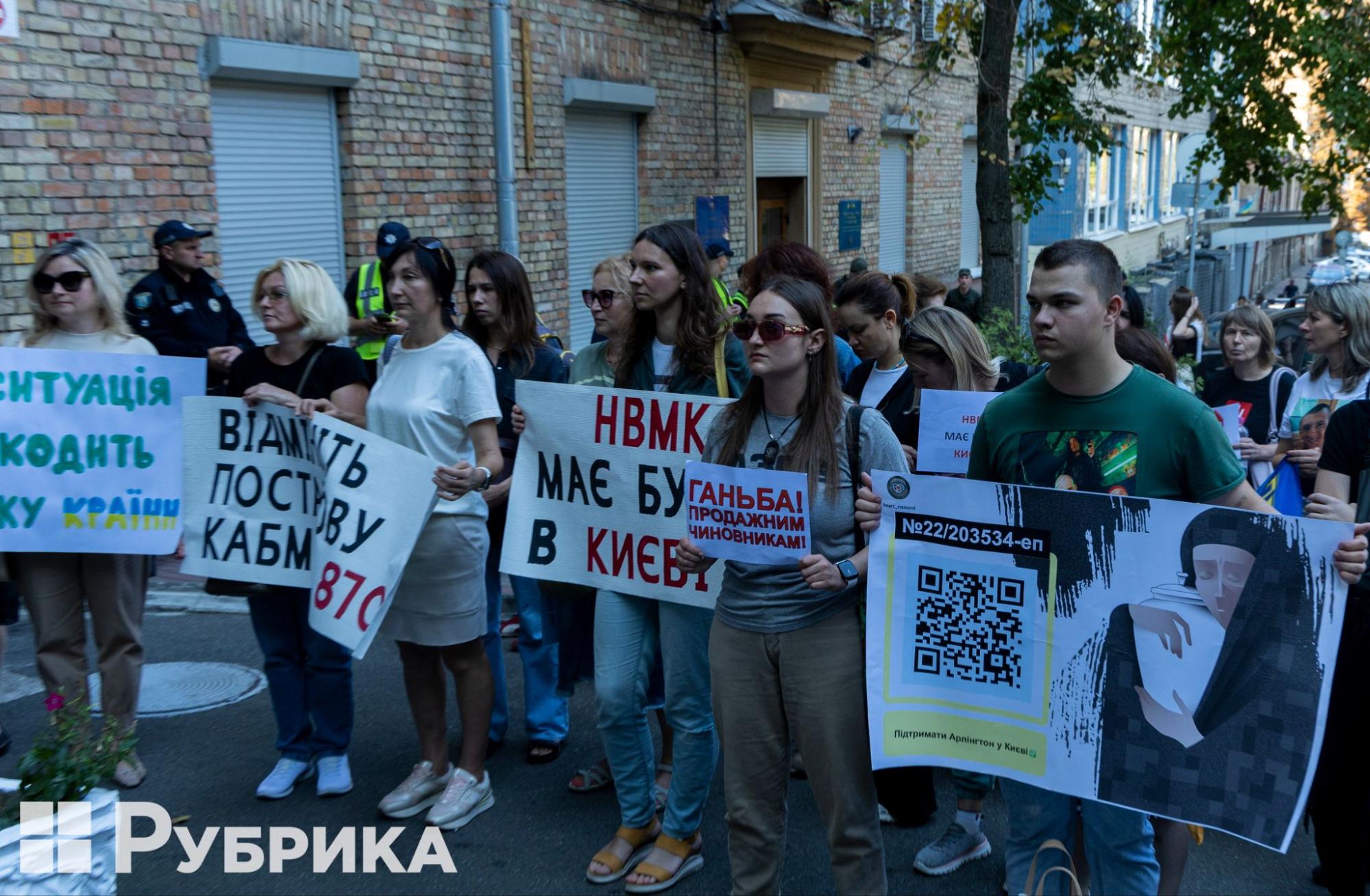
Continuation of the Voices of Fallen Heroes campaign near the Ministry of Veterans Affairs, Kyiv, September 26, 2023
How does it work?
What was the response of NMMC to Rubryka's request?
What is the National War Memorial Cemetery?
The National Military Memorial Cemetery is a volume-spatial object located on a specially allocated plot of land, which includes a military cemetery, a museum complex, a ritual building, and other necessary structures for the organization of honorable burials of fallen (deceased) persons who defended independence, sovereignty and territorial integrity of Ukraine, ensured the performance of official duties and oaths of loyalty to the Ukrainian people (according to the law On Burials and Funeral Matters).
Who can be buried at the National Military Memorial Cemetery?
In accordance with Article 15-1 of the Law of Ukraine On Burials and Funeral Matters, burial with military honors of the dead (deceased) may be carried out at the National Military Memorial Cemetery of:
- "servicemembers of the security and defense forces who defended the independence, sovereignty, and territorial integrity of Ukraine;
- servicemembers — Heroes of Ukraine, who have been awarded the Golden Star order since 2014, as well as servicemembers who have been awarded the Order of Bohdan Khmelnytsky of three classes, the Order For Courage of three classes, the Order of Princess Olga of three classes;
- participants in hostilities defined by paragraph two of clause 2, clauses 19-24 of part one of article 6 of the Law of Ukraine On the Status of War Veterans, Guarantees of Their Social Protection;
- persons with disabilities as a result of the war, defined in clauses 11-15 of the second part of Article 7 of the Law of Ukraine On the Status of War Veterans, Guarantees of Their Social Protection;
- servicemembers of the Armed Forces of Ukraine, the Security Service of Ukraine, the Foreign Intelligence Service of Ukraine, and other military formations formed in accordance with the laws of Ukraine, which, by the decision of the relevant state authorities, were sent to participate in international operations to maintain peace and security or on business trips to states on the territory of which military operations were conducted during this period.
The National Military Memorial Cemetery cannot be used to bury the above-mentioned persons who, on the day of their death, had a criminal record for committing an intentional crime unless this criminal record has been expunged and removed per the procedure established by law.
The persons mentioned in the first part of this article, who are buried in other cemeteries, are not subject to reburial at the National Military Memorial Cemetery, and their memory can be perpetuated in the museum complex of the National Military Memorial Cemetery."
The purpose of the resolution is to "regulate and simplify"
In the answer signed by acting director Yaroslav Pronyutkin, it is also said that the resolution On the implementation of an experimental project regarding the design of the National Military Memorial Cemetery was developed and adopted at a government meeting "in accordance with the mandate of the Prime Minister of Ukraine dated August 8, 2023 No. 87."
The purpose of the Resolution is to regulate and simplify the National Military Memorial Cemetery's design procedure and the mechanism for allocating land plots for the specified needs.
According to paragraph one of the resolution, the deadline for the implementation of the experimental project regarding the design of the National Military Memorial Cemetery on the territory of the Gatne Rural Territorial Community of the Fastiv District of the Kyiv region is set for July 30, 2025, clearly explained the acting director. This is not about any alternative site.
"The construction of the National Military Memorial Cemetery is planned for the end of autumn 2023, and after the commissioning of the first stage, the first burials of the fallen defenders will take place," Pronyutkin informed Rubryka.
In the answer, they reminded that according to the law, "during martial law, the location of the National Military Memorial Cemetery is determined without conducting a public discussion of the intentions of construction on the territory of the territorial community, provided for in the second part of Article 23-1 of this law."
Meanwhile, a new draft law has been submitted
In September, the Ukrainian parliament submitted a draft law on amendments to some legislative acts of Ukraine regarding the location of the National Military Memorial Cemetery. In it, a group of officials proposes to simplify the procedure for creating such a cemetery: to remove the mandatory environmental impact assessment rule, to make possible non-compliance with urban planning norms and restrictions, etc.
The non-governmental organization of the families of fallen defenders of Ukraine, Sertse nAZOVni, believes that this draft law will "bury" the project of the cemetery in Bykivnia and "will help the Ministry of Veteran Affairs to continue the project, which was developed against the demands of the families of the fallen defenders."
On October 19, the parliament considered the issue of including this draft law in the agenda of the session, but there were not enough votes for this. So, the question is now open.
The struggle of relatives continues not for land but for respect
Behind all these outrageous vicissitudes, one should not forget that it is about the great grief of specific people. They are not actually seeking land for urns but rather worthy commemoration and respect for the contribution of their relatives to the future victory of Ukraine.
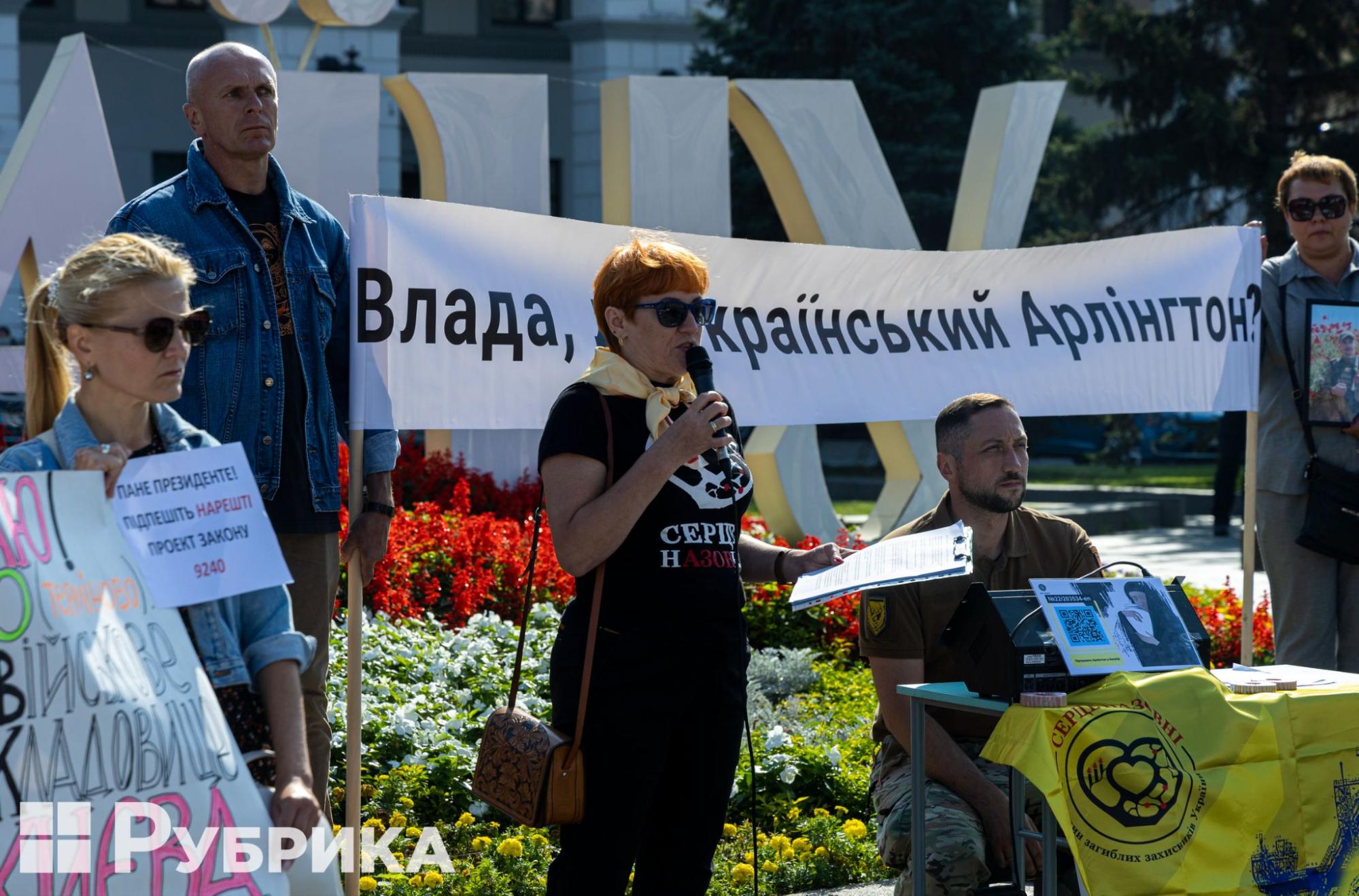
Vira Lytvynenko speaks during the Voices of Fallen Heroes campaign
As the head of the NGO of the victims' families, Lytvynenko sums up: "Unfortunately, the authorities are playing such games with us. We told them clearly that we would not take our sons to some highway and the people of Kyiv would not take them there. This is not honor, and this is not dignity. Will you go there?! Our organization has parents from all over Ukraine. People are simply shocked by the actions of the authorities."
While there is still a chance to improve everything, we hope that the state leadership will take advantage of it. In the meantime, Sertse naAZOVni has created a petition to the president asking him to sign draft law 9240 on the creation of the National Military Cemetery in Bykivnia in the city of Kyiv, and to start its construction, and they call on everyone who cares to sign it here.






